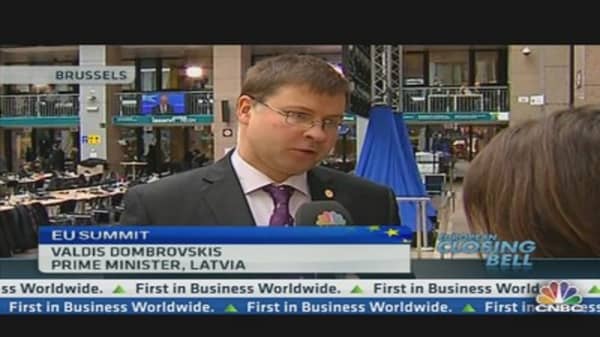Latvia's Prime Minister hit back on Friday at Paul Krugman's criticism of Latvia's austerity measures, saying the Nobel Prize-winning economist has "difficulty admitting his own mistake."
"Krugman famously said back in December 2008 that Latvia is the new Argentina, it will inevitably go bankrupt, and now he has difficulty apparently admitting he was wrong and so he tries to seek some problems in how Latvia is recovering from the economic crisis," Latvian leader Valdis Dombrovskis told CNBC in an interview at the EU summit in Brussels.
"But I think that the mere fact that for the last two years we are enjoying rapid growth shows that it was probably the right strategy."
Latvia's government undertook a heavy dose of austerity after a credit boom led to an economic crash in 2008. The government undertook the biggest fiscal adjustment drive of any country in the European Union and gross domestic product (GDP) plunged 24 percent in 2009.
This commitment to fiscal prudence, and Latvia's subsequent growth of 5.5 percent in 2011 and 4.5 percent in 2012, has led the country to be feted by proponents of austerity, such as German Chancellor Angela Merkel.
(Read More: Used to Hardship, Latvia Accepts Austerity, and Its Pain Eases)
However, Krugman, who is known for his strictly anti-austerity stance, has remained consistent in his criticism of the Baltic state.
"The adulation over Latvia really tells us more about what the European policy elite wants to believe than it does either about the realities of Latvian experience or the fundamentals of macroeconomics," Krugman wrote in a blog post for the New York Times on January 2, entitled Latvia, Once Again.
"We're looking at a Depression-level slump, and 5 years later only a partial bounceback; unemployment is down but still very high, and the decline has a lot to do with emigration. It's not what you'd call a triumphant success story," he continued.
Latvian unemployment stood at 14.3 percent in 2012, according to the CIA's World Factbook. Emigration from Latvia has increased by 13 percent in the last decade, a trend that increased markedly since austerity measures were introduced, particularly among the younger, better-educated generation.
Earlier this year, Dombrovskis said the success of his austerity drive meant there was now scope for some stimulus measures such as lowering labor taxes and increasing public sector wages.
(Read More: Role Model of European Austerity Turns to Stimulus)




